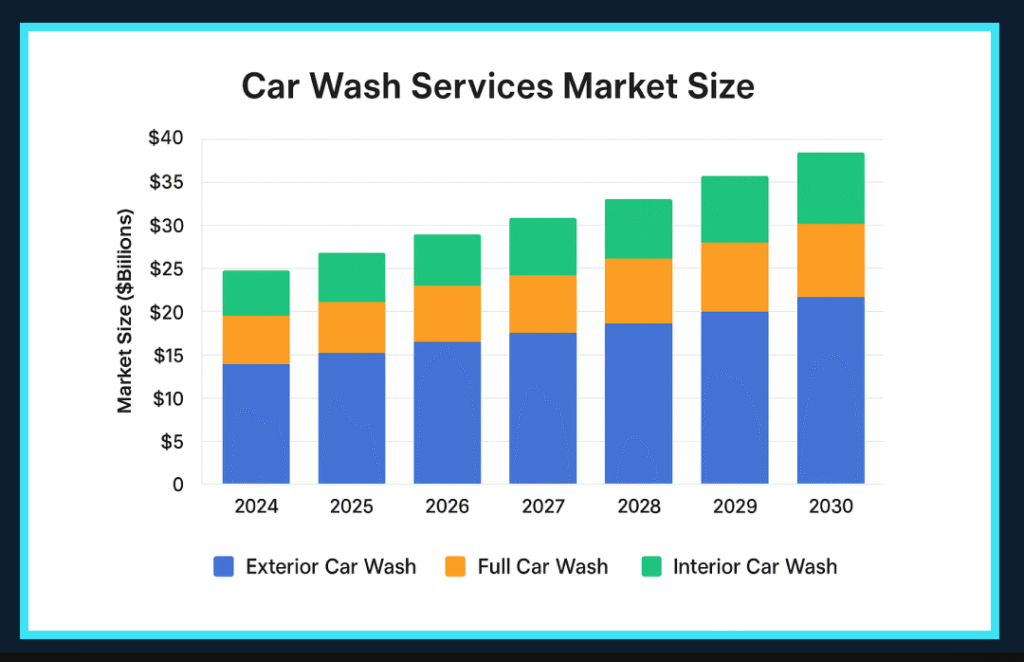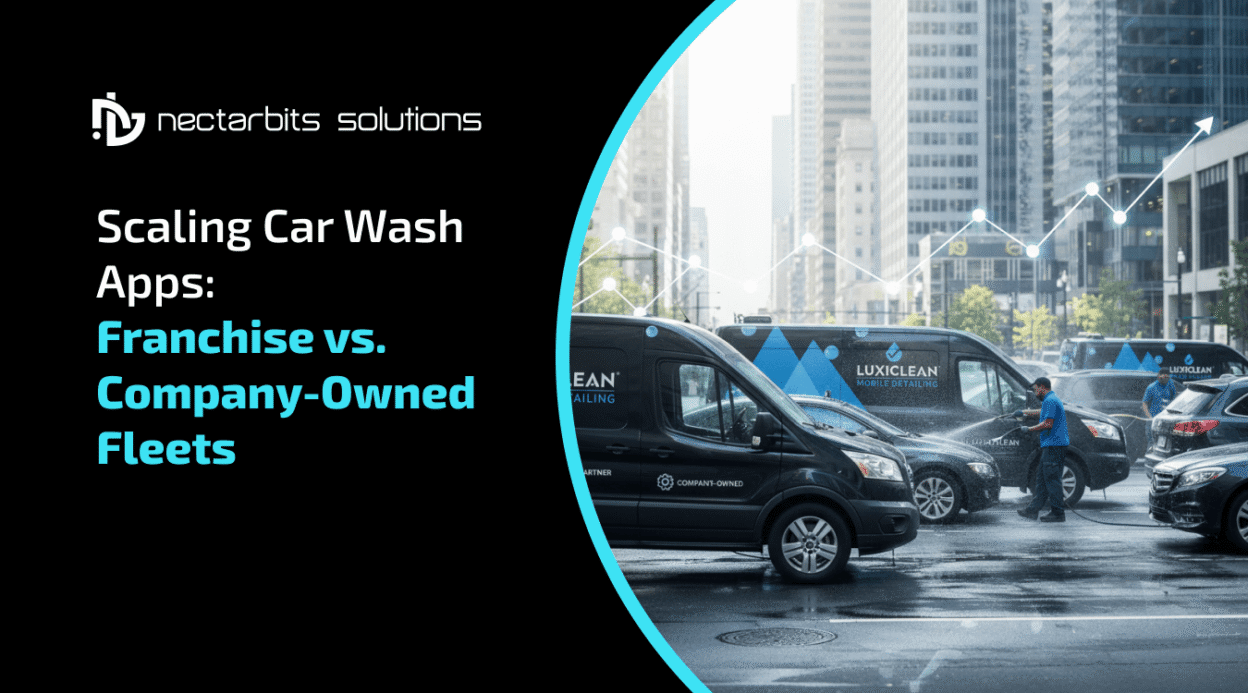Summary
- Market growth: The global car wash service market is thriving—valued at $34.31 billion in 2024 and projected to reach $49.06 billion by 2030 at a CAGR of 6.2%. North America dominates with a 50.2% share, while cashless payments (71.1%) and automated roll-over/in-bay washes (55.3%) define consumer preferences.
- Franchise model: Ensures instant brand recognition, proven systems, training, and easier funding. Ideal for entrepreneurs seeking low risk and structured growth. However, it comes with higher startup costs, ongoing royalties, and limited flexibility.
- Independent model: Provides complete creative freedom, full profit retention, and unlimited scalability. It suits risk-takers who want to build their brand from scratch. But it demands more marketing, higher effort, and slower initial growth.
- Tech advantage: Digital transformation—through car wash apps, automation, and modern payment systems—is redefining efficiency, customer experience, and scalability across both models. Integrating smart scheduling, CRM, and AI-based analytics is now key to staying competitive.
- Decision insight: Choosing between a car wash franchise vs its own business ultimately depends on your long-term vision—structured expansion with franchise support or independent growth with full control. Either way, technology remains the real accelerator behind profitable, scalable car wash ventures.
Introduction
When a startup plots to scale a mobile car wash business, the choice between a car wash franchise vs its own business model is critical. On one hand, franchises tap outside capital and networks; on the other, company-owned fleets keep full control. Grand View Research estimates the global on-demand car wash market at $23.80 billion in 2024, rising to $33.95 billion by 2030 (Grand View Research 2024).
That’s roughly a 6% annual growth rate and clear proof that convenience sells. With the market expanding, every operational decision from staffing to scheduling suddenly matters. Startups that delay a clear expansion strategy often face costly course corrections.
This pie chart from Grand View Research illustrates the Car Wash Service Market’s Share by Mode of Payment for 2024. The graphic divides payments into two main categories: Cashless Payment (dark purple) and Cash Payment (light blue). The data is presented in the context of a robust industry, with the estimated Global Market Size for 2024 valued at a significant $34.3 billion.

Scaling Car Wash Apps: Franchise vs Company-Owned Fleets
The car wash industry is experiencing a significant surge, fueled by evolving consumer habits and technological advancements. As the market continues to expand, entrepreneurs and established businesses are looking for the most effective strategies to scale their operations, particularly with the rise of car wash apps. Partnering with the Best Car Wash App Development Service can help streamline this digital transformation, ensuring your app architecture, customer experience, and operations are built for scalability.
This blog post will delve into the intricacies of each approach, exploring their pros, cons, and key differences within the context of the burgeoning car wash service market. This analysis offers a strategic overview for business owners aiming to leverage technology for growth, highlighting the trade-offs between brand control and operational support.
Car Wash Service Market Summary
The global car wash service market is a dynamic and rapidly growing sector, valued at an impressive USD 34.31 billion in 2024. This market is projected to reach a staggering USD 49.06 billion by 2030, reflecting a robust Compound Annual Growth Rate (CAGR) of 6.2% from 2025 to 2030. This expansion is driven by escalating consumer demand for convenience, the steady increase in global vehicle ownership, and the growth of urban populations.
The growing popularity of subscription-based and eco-friendly car wash solutions further supports the market’s momentum. Key trends indicate that North America holds a dominant 50.2% revenue share. Notably, for app development, cashless payment accounted for the largest revenue share of 71.1% in 2024, underscoring the necessity of digital integration for future success.
Key Market Trends & Insights:
- North America’s Dominance: In 2024, the North American car wash service industry commanded a significant 50.2% revenue share of the overall global market, highlighting its maturity and robust consumer base.
- U.S. Growth: The U.S. car wash service industry is anticipated to grow at a healthy CAGR of 6.0% from 2025 to 2030, further cementing North America’s position.
- Europe’s Contribution: Europe also holds a substantial share, accounting for 21.2% of global revenue in 2024.
- Cashless Reigns Supreme: In terms of payment methods, cashless payments dominated in 2024, securing the largest revenue share at 71.1%. This underscores the importance of integrating modern payment solutions, especially for app-based services.
- Roll-Over/In-Bay Popularity: Regarding service type, roll-over/In-Bay car wash services held the largest revenue share of 55.3% in 2024, indicating a strong preference for automated wash experiences.
Market Size & Forecast:
- 2024 Market Size: USD 34.31 billion
- 2030 Projected Market Size: USD 49.06 billion
- CAGR (2025-2030): 6.2%
- North America: The largest market in 2024, demonstrating established consumer demand and infrastructure.
The data unequivocally points to a thriving industry ripe for innovation and expansion, particularly through digital platforms and app-driven services. The question then becomes: what is the optimal strategy for deploying and scaling these operations?
Franchise vs. Own Business (Independent): Why It Matters
The decision between operating as a franchise or building your own independent car wash business, especially with an accompanying app, has profound implications for every facet of your venture – from initial investment and operational control to marketing and long-term growth.
Pros of a Franchise Model:
- Instant Brand Recognition:
- Leverage an already established, trusted brand name.
- Benefit from a built-in customer base from day one.
- Reduces the need for extensive initial brand-building efforts.
- Proven Business Model:
- Access to a refined, standardized operational framework.
- Minimizes guesswork and significantly reduces the risk of business failure.
- Clear guidelines for everything from service offerings to customer interaction.
- Extensive Training and Support:
- Franchisors typically provide comprehensive initial training programs.
- Ongoing guidance, operational support, and access to a robust network of fellow franchisees.
- Help with site selection, equipment procurement, and initial setup.
- Centralized Marketing Efforts:
- Benefit from national and regional marketing campaigns coordinated by the franchisor.
- Reduces individual marketing burden and costs.
- Consistent brand messaging across all locations.
- Easier Access to Funding:
- Banks and lenders are often more inclined to finance a franchise.
- The proven success rate and established business plan reduce perceived risk for financiers.
- Clear Exit Strategy:
- Selling a well-known franchise can be easier due to its established brand and operational procedures.
- There’s a clearer path to finding prospective buyers.
Cons of a Franchise Model:
- Limited Control and Flexibility:
- Strict adherence to the franchisor’s rules on branding, pricing, services, and operations.
- Less autonomy to innovate or adapt quickly to local market changes.
- Decision-making power is largely centralized with the franchisor.
- Higher Startup Costs:
- Requires an initial franchise fee, which can be substantial.
- Additional costs for equipment, inventory, and specific licensing requirements mandated by the franchisor.
- Ongoing Royalties and Fees:
- Obligation to pay the franchisor a percentage of your revenue regularly.
- Contribution to national advertising funds, regardless of local campaign effectiveness.
- Growth Potential Can Be Structured/Limited:
- Expansion might be restricted to specific territories defined by the franchise agreement.
- Less freedom to diversify services or enter entirely new markets independently.
- Shared Brand Reputation:
- Your business’s reputation can be impacted by the actions or failures of other franchisees.
- Less control over the overall brand image.
Pros of an Own Business (Independent) Model:
- Complete Creative Control:
- Full autonomy to make all decisions regarding your business.
- Freedom to innovate, develop unique services, and implement your vision without restrictions.
- Agility to adapt rapidly to market changes or customer feedback.
- Higher Profit Margins (No Royalties):
- You keep all your profits, as there are no ongoing royalty payments to a franchisor.
- Potential for greater financial reward if the business is highly successful.
- Full Independence:
- Empowerment to build your brand from the ground up, fostering a strong sense of ownership.
- Freedom to experiment with different operational models and marketing strategies.
- Unlimited Growth Potential:
- Unrestricted ability to scale your business into new markets, expand service offerings, and diversify revenue streams.
- No territorial limitations imposed by a franchise agreement.
- Potentially Lower Initial Costs (No Franchise Fee):
- Avoids the upfront franchise fee, which can significantly reduce initial capital outlay.
- More control over equipment choices and operational setup costs.
Cons of an Own Business (Independent) Model:
- Slow Brand Recognition:
- You must build brand identity, customer trust, and market presence from scratch.
- Requires significant time, effort, and investment in marketing and public relations.
- Create Your Own Business Model:
- You develop your own systems through trial and error, which inherently carries a higher risk.
- More operational challenges and potential inefficiencies in the initial stages.
- Minimal Training and Support:
- Solely responsible for your own training and expertise development.
- Relies on personal experience, hiring consultants, or self-learning, which can be costly and time-consuming.
- Marketing is Your Responsibility:
- You must develop and execute your entire marketing strategy, which requires expertise, resources, and continuous effort.
- It can be a significant financial burden.
- Generally Harder Access to Funding:
- Securing loans can be more challenging without a proven track record or established brand recognition.
- Lenders perceive a higher risk for unproven independent ventures.
- Exit Strategy Depends on Business Establishment:
- Selling an independent business can be harder if your brand is not well-established or if it’s heavily reliant on your personal involvement.
Key Differences at a Glance:
| Aspect | Franchise | Own Business (Independent) |
| Brand Recognition | Proven blueprint. Follow a refined, standardized framework. | Slow. Must build identity and trust from scratch. |
| Business Model | Limited. Adhere to the franchisor’s strict rules. | Create your own. Develop systems through trial and error. |
| Control & Flexibility | Often higher. Initial franchise fee, equipment, and licensing. | Complete. Total autonomy for all decisions. |
| Startup Costs | Clear path. Easier to sell a well-known franchise. | Can be lower. Avoid franchise fees; marketing adds up. |
| Ongoing Costs | Ongoing royalties and fees, national advertising contributions. | No royalties. Keep all profits, responsible for all expenses. |
| Training & Support | Extensive. Comprehensive training, ongoing guidance, network. | Minimal. Responsible for own training, rely on expertise. |
| Marketing | Provided. Benefit from national/regional campaigns. | Your responsibility. Develop and execute own strategy. |
| Access to Funding | Generally harder. Challenging without a track record. | Structured. Expand within the territory, limited by agreement. |
| Growth Potential | Often easier. Banks are more likely to finance a proven franchise. | Unlimited. Unrestricted potential to scale and diversify. |
| Exit Strategy | Depends on the business. Harder if the brand is not well-established. | Depends on the business. Harder if the brand not well-established. |
How to Choose the Right Model
The optimal choice between a franchise and an independent car wash business largely hinges on your personal aspirations, professional goals, risk tolerance, and available resources.
Choose a Franchise if you value:
- A Safety Net: You prefer a lower-risk entry into business ownership with a proven operational playbook and reduced uncertainty.
- Established Systems: You are detail-oriented and comfortable following a set of rules and procedures, preferring structure over self-creation.
- Brand Power: You want to leverage existing brand recognition, a pre-built customer base, and collective marketing efforts to attract customers from day one.
- Team Support: You are a first-time entrepreneur or someone who benefits from having access to a network of support, comprehensive training, and shared resources.
- Predictability: You appreciate the predictability of costs, revenue projections (based on other franchises), and operational procedures.
Choose to Own Your Business (Independent) if you value:
- Complete Creative Control: You have a unique vision for your car wash app and service, and you want the absolute freedom to make every decision without external restrictions.
- Higher Profit Margins: You are willing to forgo the support of a franchise to keep all your profits, rather than paying ongoing royalties and fees.
- Full Independence: You are a self-starter who thrives on building things from the ground up, learning through direct experience, and charting your own course.
- Unlimited Potential: You possess the vision, innovation, drive, and risk tolerance to achieve high-level growth and expand into new markets or service offerings without any franchisor limitations.
- Innovation: You want the agility to quickly implement new technologies, payment methods (beyond the car wash app itself), or eco-friendly solutions without bureaucratic delays.
Cost to Build a Car Wash App
The cornerstone of modern car wash scaling—whether franchise or independent—is a robust mobile application. The investment required for this technology varies significantly based on complexity, features, and the development approach. You can also explore detailed Car Wash App Pricing insights to plan your budget and maximize ROI.
Estimated Development Investment
- Simple App (MVP – Minimum Viable Product): A basic app with essential features like sign-up, service selection, and basic payment integration can range from $10,000 to $25,000. This approach is ideal for testing the market.
- Moderately Complex App: A solution integrating features like real-time GPS tracking, loyalty programs, push notifications, and a comprehensive admin panel typically costs between $25,000 and $50,000.
- Highly Complex, Custom Solution: An advanced, multi-platform app (iOS and Android native) that includes AI-driven scheduling, dynamic pricing, and deep integration with existing Point-of-Sale (POS) systems can easily exceed $50,000 to $100,000+.
Key Cost Factors
| Feature/Service | Cost Impact |
| Platform Choice | Native (iOS + Android) is more expensive than Cross-Platform (e.g., Flutter). |
| UI/UX Design | Custom, highly complex, and interactive designs drive costs higher. |
| Backend & APIs | Integration of third-party services (payment gateways, maps) adds to the cost. |
| Post-Launch Maintenance | Businesses must budget an additional 15-20% of the initial development cost annually for ongoing updates, bug fixes, and feature enhancements. |
How Nectarbits Can Help You Scale Digitally
Scaling a car wash business in the digital age requires more than just a good idea; it demands sophisticated technology and a proven execution partner. Nectarbits specializes in developing custom, scalable on-demand solutions that address the unique challenges of both the franchise and independent models—offering tech-powered car wash services designed to drive automation, improve efficiency, and ensure growth.
Strategic Support for Both Models
- Franchise Scalability: Nectarbits can build a white-label application platform that allows a franchisor to rapidly onboard new franchisees. This ensures brand consistency, centralized data management for royalties, and standardized operational procedures across the entire network, reducing development costs for each new location.
- Independent Innovation: For independent owners, Nectarbits delivers fully custom solutions built to a unique vision. This grants the complete creative control and unlimited growth potential that independent owners seek, providing the bespoke features necessary to carve out a niche and compete with large brands.
Core Digital Services Offered
- Custom App Development: Building feature-rich mobile apps with essential components like geo-location services, flexible booking and scheduling, and secure cashless payment integration (essential given the 71.1% cashless market share).
- Business Consultation & Discovery: Conducting in-depth workshops to define the optimal feature set and business strategy, ensuring the app is aligned with either the tight guidelines of a franchise or the innovative goals of an independent owner.
Scalable Architecture: Utilizing robust cloud-native technologies to ensure the app can handle massive user growth—crucial for both a rapidly expanding franchise network and an independent fleet targeting high volume.
Conclusion:
As the car wash industry accelerates toward digital transformation and sustainability, the right business model becomes a defining factor. Entrepreneurs seeking structure, safety, and established success may find a franchise the ideal path. But for those driven by innovation, independence, and long-term scalability, building an independent car wash business with a dedicated app can unlock far greater creative and financial rewards.
The future belongs to businesses that combine operational excellence with digital convenience—whether through a franchise network or a fully owned brand built from the ground up.

(FAQs)
How big is the on-demand car wash service market?
The on-demand car wash market is substantial and expanding, driven by rising app adoption and convenience-first consumer habits. It now represents a multibillion-dollar global segment with steady year-over-year growth as mobile and doorstep services gain traction.
What is the on-demand car wash service market growth?
Growth is steady and healthy, generally tracking mid-single-digit to low-double-digit annual rates depending on the region and subsegment. Mobile and app-enabled offerings tend to grow faster than traditional fixed-site services because of greater convenience and repeat-use potential.
Which region accounted for the largest on-demand car wash service market share?
North America leads the pack in terms of market share and revenue, followed by regions with rapid urbanization and smartphone penetration. The U.S., in particular, is a primary driver thanks to strong consumer demand for app-driven services and well-developed logistics networks.
Who are the key players in the on-demand car wash service market?
The landscape mixes national chains, regional operators, and app-native startups. Expect to see established car wash brands, well-funded mobile-wash platforms, and many local operators competing in different markets. The sector remains fragmented in many areas, leaving room for consolidation and new entrants.
What are the factors driving the on-demand car wash service market?
Convenience (easy booking and doorstep delivery), higher smartphone and app adoption, subscription models, and improved scheduling and routing technology are core drivers. Environmental pressures and regulations are also encouraging investment in water-efficient and automated systems, which further spur innovation and market activity.




